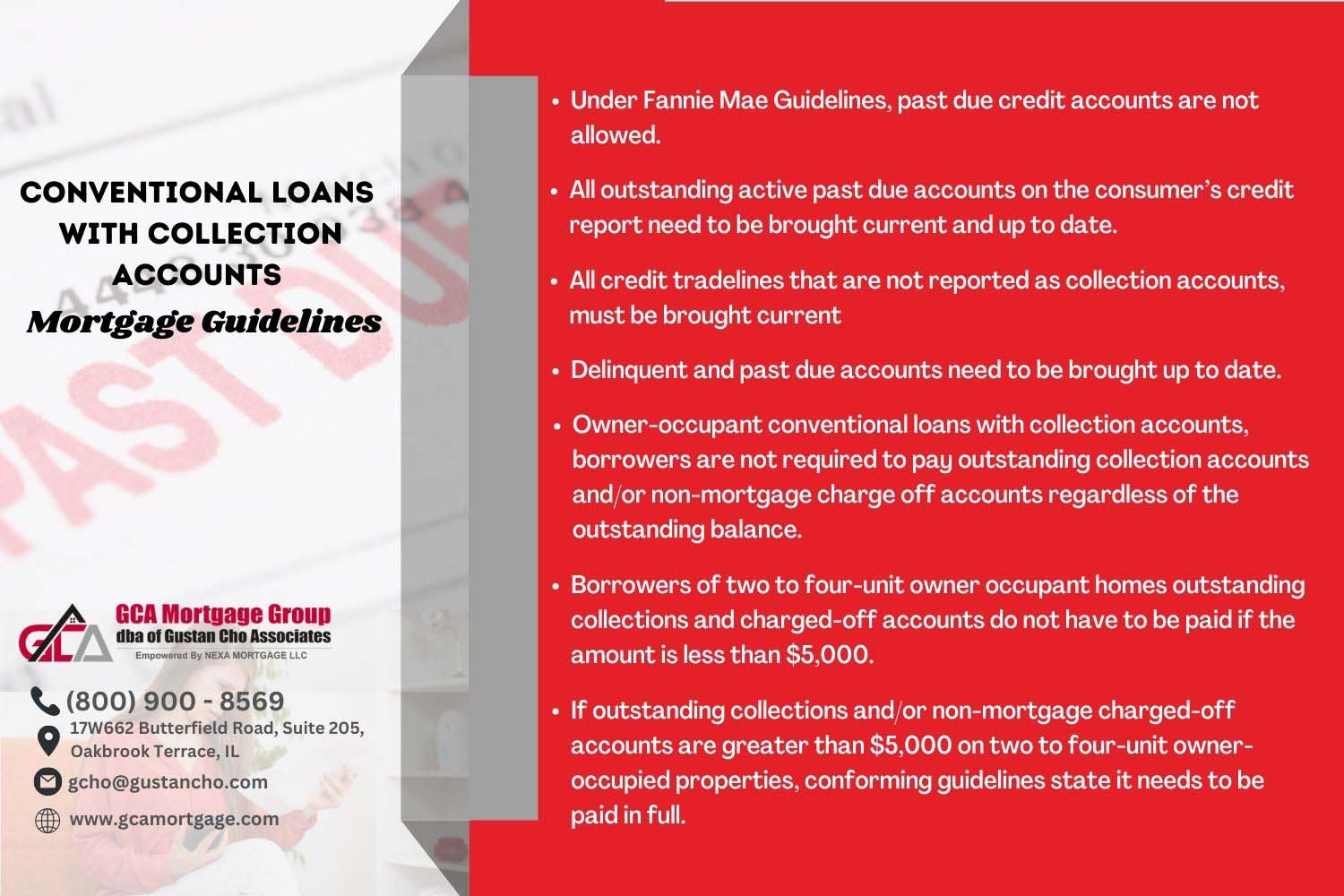Conventional Loans With Collection Accounts Mortgage Guidelines
This Article Is About Mortgage Guidelines On Conventional Loans With Collection Accounts
Conventional Loans With Collection Accounts Guidelines are implemented and set by Fannie Mae and Freddie Mac. FHA is the most popular loan program in the United States. Most buyers of homes think that just because they have outstanding collections and charged-off accounts they can only qualify for FHA home loans and not Conventional Loans. There are many instances where consumers can qualify for conventional loans BUT NOT FHA Loans. For example, FHA does not allow Income-Based Repayment (IBR) on student loans. However, IBR Payments are allowed with Conventional Loans.
There are other issues where homebuyers can encounter where they do not qualify for FHA Loans but will qualify for Conventional Loans.
General Mortgage Guidelines On Derogatory Credit Tradelines

The United States Department of Housing and Urban Development (HUD) is the parent of the Federal Housing Administration (FHA). FHA has the most lenient lending guidelines when it comes to outstanding collections and charged-off accounts. HUD 4000.1 FHA Handbook sets the lending guidelines pertaining to FHA Loans. Both Fannie Mae and HUD have separate lending guidelines pertaining to outstanding collection accounts and charge-off accounts. Conventional Loans with Collection Accounts Guidelines are governed by Fannie Mae and Freddie Mac. Unpaid outstanding collection accounts and charge-off accounts are tougher with Fannie Mae and Freddie Mac to get an approve/eligible per Automated Underwriting System Approval.
Conventional Guidelines On Collections And Derogatory Credit
In this blog article, we will be discussing non-mortgage conventional loans with collection accounts guidelines. Fannie Mae and Freddie Mac are the two mortgage giants that set Guidelines on conventional loans. Under Fannie Mae Guidelines, past due credit accounts are not allowed. All outstanding active past due accounts on the consumer’s credit report need to be brought current and up to date.
All credit tradelines that are not reported as collection accounts, must be brought current.
Delinquent and past due accounts need to be brought up to date. With owner-occupant conventional loans with collection accounts, borrowers are not required to pay outstanding collection accounts and/or non-mortgage charge off accounts regardless of the outstanding balance. Borrowers of two to four-unit owner occupant homes outstanding collections and charged-off accounts do not have to be paid if the amount is less than $5,000. If outstanding collections and/or non-mortgage charged-off accounts are greater than $5,000 on two to four-unit owner-occupied properties, conforming guidelines state it needs to be paid in full. The above conventional mortgage guidelines apply for second home financing as well.
Investment Property, Conventional Mortgage Guidelines
For homebuyers who intend in purchasing and qualifying for an investment home, the following guidelines apply to conforming loans. Unpaid outstanding collection accounts with an outstanding balance that is greater than $250 need to be paid. The outstanding non-mortgage, charge off accounts that equal or is greater than $250 and a total of more than $1,000 must be satisfied.
FHA Versus Conventional Loans With Collection Accounts

HUD, the parent of FHA, differs from their guidelines on outstanding collection accounts.
FHA classifies collection accounts into three categories:
- Medical Collection Accounts
- Non-Medical Collection Accounts
- Charge Off Accounts
FHA exempts medical collection accounts and charged-off accounts from debt to income ratio calculations.
Here is how FHA states on-medical collection accounts with outstanding balances of greater than $2,000.
A 5% of outstanding balance needs to be used as a monthly hypothetical debt. Any non-medical collection accounts over $2,000 do not have to be paid. However, 5% of the outstanding collection balance is used as a hypothetical debt to calculate debt to income ratios of the borrower. This does not apply to conforming loans.
Overlays On Conventional Loans
Over 75% of our borrowers at Gustan Cho Associates Mortgage Group are folks who could not qualify at other lenders due to their lender overlays. Most banks and lenders have their own lender overlays.
Even if borrowers meet Conventional Loan Guidelines and do not have to pay outstanding collections and/or charged-off, lenders may require it as part of their overlays. Most lenders will not want to deal with borrowers who have outstanding collection accounts and/or charge off accounts unless it has been paid in full and reflected on their credit reports. Lenders do not have to honor mortgage guidelines and can have higher credit standards. Lenders need to meet minimum mortgage guidelines. However, they can have higher requirements called lender overlays.
Frequently Asked Questions (FAQs)
1. What Are Collection Accounts?
Collection accounts are debts transferred from the original creditor to a collection agency due to failed payment. These accounts are reported on your credit report and can significantly impact your credit score.
2. Do Collection Accounts Affect My Ability to Get a Conventional Loan?
Collection accounts can impact your ability to qualify for a conventional loan. Lenders assess your overall creditworthiness, and having collection accounts may raise concerns about your financial reliability.
3. What Are the Guidelines for Collection Accounts on Conventional Loans?
Guidelines vary by lender, but conventional loan guidelines do not require borrowers to pay off outstanding collection accounts to qualify. However, suppose the total balance of non-medical collections exceeds a certain threshold (typically $2,000). In that case, some lenders may require payment or satisfactory arrangements before approval.
4. How Do Medical Collection Accounts Impact Conventional Loan Approval?
Medical collection accounts are often treated more leniently than other types of collections. Many lenders do not require medical collections to be paid off as a condition for loan validation, recognizing that medical debt can be unavoidable and unpredictable.
5. Can I Get a Conventional Loan If I Have Recent Collection Accounts?
Qualifying for a conventional loan with recent collection accounts is possible but may be more challenging. Lenders will consider the age, size, and type of the collection accounts, as well as your overall credit profile and financial stability.
6. Should I Pay Off Collection Accounts Before Applying for a Conventional Loan?
While it is not always required, paying off or resolving collection accounts can improve your credit score and strengthen your loan application. It demonstrates financial responsibility and lessens the risk perceived by lenders.
7. How Do Charge-Offs Differ from Collection Accounts?
A charge-off happens when a creditor writes off the debt as a loss after a prolonged period of non-payment, while a collection account is when the debt is endorsed to a collection agency. Both can negatively impact your credit, but lenders may view them differently based on their policies.
8. What actions can I take to enhance my likelihood of securing a conventional loan despite having collection accounts?
To improve your chances:
Pay off or settle outstanding collection accounts.
Maintain a stable income and employment history.
Increase your credit score by managing other debts responsibly.
Save for a higher down payment to reduce the lender’s risk.
9. Are There Alternatives to Conventional Loans If I Have Collection Accounts?
Alternatives exist, such as FHA loans, which have more lenient credit requirements and may be more forgiving of collection accounts. Seeking advice from a mortgage professional can assist you in exploring all the available options tailored to your financial situation.
Conventional Loans With Collection Accounts: Types Of Lender Overlays

Some banks and lenders will even take a step further and require that the collection accounts and charge off have been paid in full and seasoned for at least two years as part of their overlays.
How can this be when Collection Accounts Guidelines do not require outstanding collection accounts and non-mortgage, charge off accounts to be paid to qualify for conforming mortgages?
The reason banks and lenders require that all unpaid outstanding collection accounts be paid in full when Fannie Mae and Freddie Mac do not require it paid off is due to mortgage lender overlays.
Overlays are additional guidelines that are set on top of the minimum guidelines by Fannie Mae and Freddie Mac. It is not illegal for a bank or lender to add additional lending requirements and standards on top of the minimum lending guidelines required by Fannie and/or Freddie. Home Buyers or homeowners who need a conventional loan but have outstanding collection accounts and/or non-mortgage, charge off accounts, and need a direct lender with no overlays, contact us at Gustan Cho Associates at 800-900-8569 or text us for a faster response. Or email us at gcho@gustancho.com. We are available 7 days a week, evenings, weekends, and holidays to take your phone calls and answer any questions you may have. Text us for a faster response.










